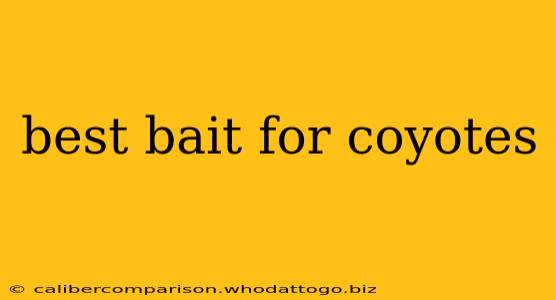Coyotes, known for their intelligence and adaptability, can be challenging to hunt. Choosing the right bait is crucial for a successful hunt, and understanding coyote behavior and preferences is key. This guide explores the best baits for attracting coyotes, focusing on effectiveness, legality, and ethical considerations.
Understanding Coyote Behavior and Diet
Before diving into specific baits, it's important to understand what coyotes eat. Their diet is incredibly diverse and opportunistic, varying by season and location. This adaptability makes choosing the right bait crucial for your specific hunting environment. Coyotes are primarily carnivores, but they are also omnivores, meaning they consume both plants and animals. Their diet typically includes:
- Small mammals: Rabbits, rodents, and ground squirrels are staple foods.
- Birds: Coyotes are opportunistic predators, targeting both ground-nesting birds and those found in trees.
- Reptiles and amphibians: Lizards, snakes, and frogs are sometimes included in their diet.
- Fruits and vegetation: Especially during lean times, coyotes will supplement their diet with berries, fruits, and other vegetation.
- Carrion: They are scavengers and will readily consume dead animals.
Understanding this broad diet helps in selecting effective bait. Simply put, the best bait mimics a natural food source attractive to coyotes in your area.
Top Bait Options for Coyote Hunting
The effectiveness of different baits can vary depending on location, season, and the specific coyote population. Experimentation is key to finding what works best in your hunting area. Here are some of the most effective bait options:
1. Commercial Coyote Lures:
Many commercially available lures mimic the scent of prey animals, often combined with attractants to enhance their appeal. These lures are convenient and readily available, but their effectiveness can vary significantly. Read reviews and try different brands to find one that works well in your hunting area.
2. Natural Baits:
Using natural baits can be highly effective and often more ethically sound. Options include:
- Rabbit or rodent carcasses: The scent of decaying meat is a powerful attractant for coyotes. However, ensure the carcass is fresh enough to attract coyotes without becoming too foul-smelling to deter them. Legal regulations regarding the use of carcasses should be checked.
- Fish: The strong odor of decaying fish can also be very effective, particularly near water sources. Again, freshness is crucial.
- Sweet attractants: While primarily carnivorous, coyotes can be tempted by sweet scents, especially during times of scarcity. Combine these with meaty scents for best results.
3. Scent Combinations:
To maximize effectiveness, consider combining different scents. For example, combining the scent of a decaying animal with a strong-smelling attractant can create an irresistible lure.
Ethical and Legal Considerations
Always check and abide by local hunting regulations before using any bait. Some jurisdictions restrict or prohibit the use of certain baits. Ethical hunting practices are paramount. Avoid using baits that could harm non-target species, and ensure that your hunting methods are humane and efficient.
Placement and Timing of Bait
The success of your hunt also relies heavily on proper bait placement and timing.
- Location: Place the bait in areas where coyote activity is high, such as trails, den sites, or areas with abundant prey. Consider using a bait station to prevent the bait from being easily disturbed or scavenged by other animals.
- Timing: Coyotes are most active during dawn and dusk. Place your bait in the late afternoon or early evening for optimal results.
- Scent Drag: Consider dragging a scent trail leading to your bait to further attract coyotes.
Conclusion:
Selecting the best bait for coyotes requires understanding their dietary habits and local regulations. Experimentation with different baits, careful placement, and ethical considerations are vital for a successful and responsible hunting experience. Remember that patience and persistence are key to attracting and successfully hunting these intelligent predators. Always prioritize safety and responsible hunting practices.

